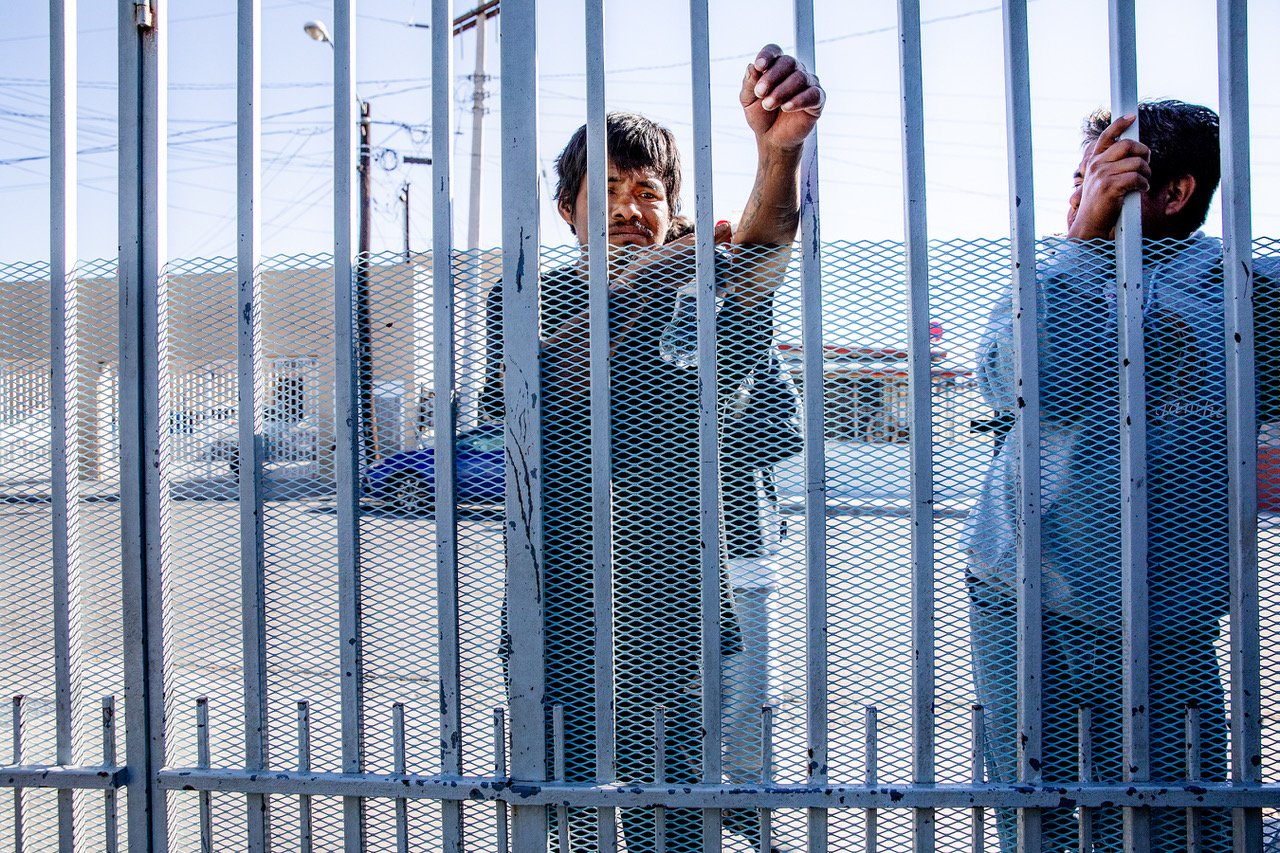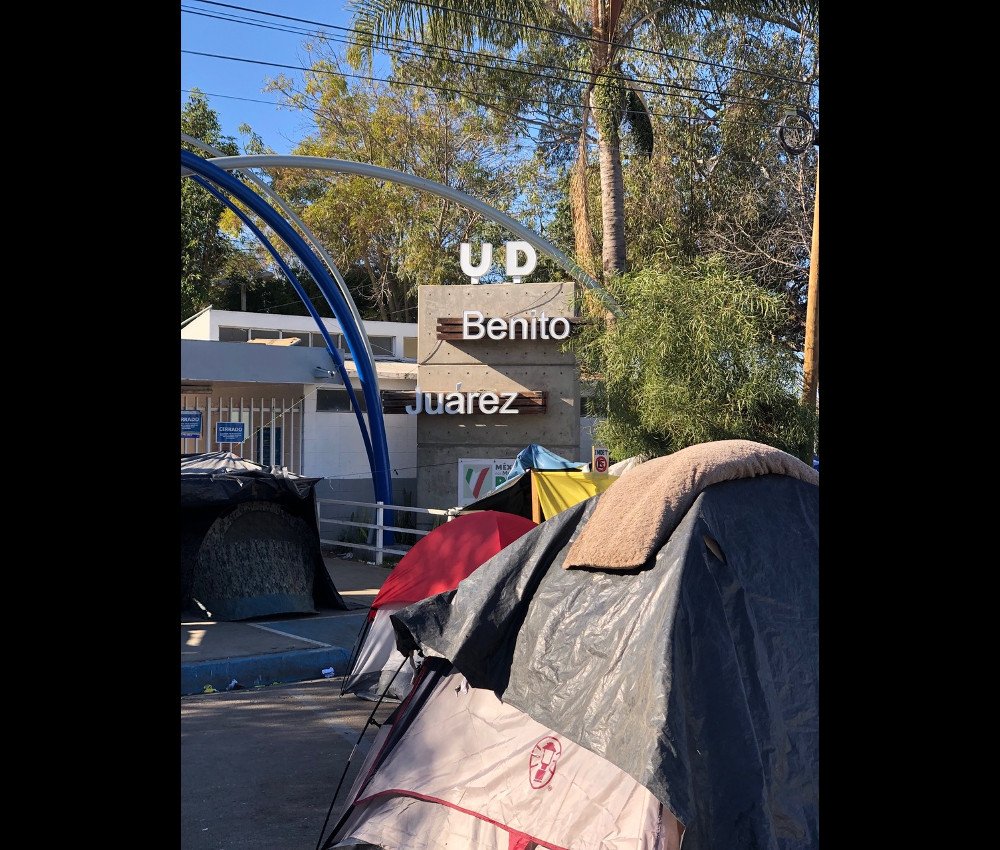“Migrants hold in their hearts an idealised America”


Jeanna Deswert is a midwife based in Texas, USA. With a background in foreign politics, she has devoted her career to global health and advocating for reproductive rights. She volunteers with Midwife Pilgrim, a nonprofit dedicated to providing compassionate midwifery care to communities in crisis and disasters around the world. She recounts her experience working with the migrant caravan in Tijuana, Mexico.
In April 2018 I began to hear reports of an organised movement of migrants from Central America making their way to the United States. These reports came amidst the media storm on the Trump Administration’s immigration policies including the construction of detainment camps and separation of children from their families. The tent encampment built near the Tornillo Port of Entry in June was only 36 miles from where I lived. For once I did not have to travel to the crisis, the crisis came to me.
The city of El Paso began experiencing an influx in refugees and migrants seeking asylum. The majority of those in El Paso were individuals who had been detained by The U.S. Department of Immigration and Customs (ICE) and then released at bus stations with no food, no shelter, no money, and no resources to help them move forward. The burden of care fell on the organisations and volunteers who stepped up to provide assistance and support to those who were stranded. Living and working in politically charged border cities requires a deep understanding of social justice and the ability to center one’s practice around that foundation is required.
I had just returned home from North Africa, long enough to unpack my suitcase, wash my clothes, and put them right back into my bag. The unpredictable nature of a humanitarian crisis is exactly that, unpredictable. I had no longer touched down in Dallas and the messages were flooding in, asking when I could mobilise. Less than a week later and there I was, in Mexico, providing reproductive and sexual health care services for the migrants who had traveled north in the ‘caravan’.

The border between the United States and Mexico positions Mexico as a transit country for migrants, immigrants, and refugees moving north. The ‘caravan’ represents an organised movement of migrants that originated in Honduras in 2018. The first caravan began in April 2018 and the second movement developed in October of the same year. The second caravan was mobilised through a social media campaign in response to high rates of unemployment, economic instability, poverty, a decline in the public trust in the central government, and a marked increase in gang-related violence in Honduras.
As the caravan moved through Central America, individuals from El Salvador, Guatemala, Nicaragua, and Mexico joined the group as they made their way north to the border of the United States to seek asylum. The reported number of migrants varies with estimate from the United Nations (UN) ranging between 12,000 – 14,000 migrants, UNHCR estimates range from 6,200 – 7,000 migrants; and the Mexican government reports range between 1,800 – 3,000 migrants.
The majority of migrants in the caravan settled into Tijuana, Mexico where they wait for the opportunity to apply for asylum to the United States. The asylum process is burdened by policy and politics and the majority of people in Tijuana have been waiting for their turn for several months. The only officially recognised, government migrant camp in Tijuana closed and the thousands of migrants held there were forced into other smaller camps and shelters throughout the city.
Few things have shattered my heart more than looking into the eyes of hope and drowning that hope in reality
Jeanna Deswert
The public health system infrastructure is overburdened by the influx and is responsible for addressing the acute and emergent health care needs of the migrant population. It is supported by various organizations and volunteer groups that travel to Tijuana to provide care in clinic and outreach settings.
I traveled to Tijuana, Mexico on behalf of Midwife Pilgrim to conduct an organisational needs assessment on migrant sexual and reproductive healthcare in Tijuana. Midwife Pilgrim is an independent, non-profit, non-political organisation supported by volunteer midwives and healthcare professionals. The organisation has grown and expanded to meet the diverse reproductive and sexual health care needs of displaced populations, migrant communities, and refugees in Eastern Europe, the Middle East, Asia, and Africa. We serve on the front lines of humanitarian crises across the world and work to establish safe and skilled health care services in unique and diverse settings.
Midwife Pilgrim prioritises the development of partnerships with local providers and focuses on supporting the existing local medical infrastructure while responding to the acute care needs of pregnant and reproductive-age individuals. We also focus on supporting community-based efforts in the transition from crisis response to stabilisation by sharing knowledge and extending resources to relief workers, traditional birth attendants, and community health workers.
In Tijuana we identified the local providers who were spearheading migrant health efforts and partnered with them to learn how we support their work. In doing so we conducted assessments of each identified official and unofficial camp and shelter, identifying needs, strengths, and gaps in care and resources. Clinic outreach provided another opportunity to not only conduct assessments but to provide direct patient care.
Every weekend a medical brigade crosses the border from San Diego, California to Tijuana to do clinic outreach at different camps and shelters. We had the opportunity to connect with this group and accompany them to several locations where we saw first-hand the extent of healthcare needs and listened to countless harrowing stories of the journey north to the border.

The migrants come to the border with hope. Hope for a future and the promise of a better life. They hold in their hearts an idealised version of America. One that is waiting for them with open arms and immigration lawyers ready to fight for their rights. They believe in the myth of America and the cold reality of what it really means is twisted tighter than the rolls of cold razor wire that decorate the lines drawn between here and there.
The reality is, there are not enough immigration lawyers who can help. The truth is they cross that border and walk straight into indefinite detention where they wait to defend their case, often without any legal representation. Some leave with ankle accessories tracking their movements while others are immediately deported back to the violent world they tried to leave behind. Some are separated from their families and wait years to be reunited. It is inevitable, almost every person I cared for asked the same questions and expressed the same idealised notion of America.
I remember sitting in a meeting on my first day in Tijuana, listening to a lawyer who has dedicated his time to helping the migrant population navigate the asylum and immigration process. He warned us about the idealized version of America the migrants held onto and stressed the importance of telling the truth. The truth of what really waits for them on the other side of the border. Few things have shattered my heart more than looking into the eyes of hope and drowning that hope in reality.
This is the reality that reinforces the need to provide system-level organisational support to meet the acute and long-term healthcare needs of those who have little to no access to care. Midwifery embodies so much more than catching babies. The birth of the baby is only one component of care as midwifery extends beyond the mother-baby dyad, into the family and wider community.
In an international setting midwifery is about identifying the reproductive and sexual healthcare needs of an at-risk population. It is about leveraging resources and tools to support local providers and the existing health infrastructure. It is about establishing communication and trust. It is about establishing a long-term system of support that will continue to help support local efforts long after we have left.
Read about Jeanna’s experience volunteering in Eko refugee camp in Greece here.
Featured photo and Jeanna’s portrait by Hal Myers.

One thought on ““Migrants hold in their hearts an idealised America””